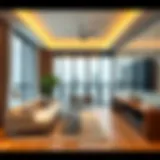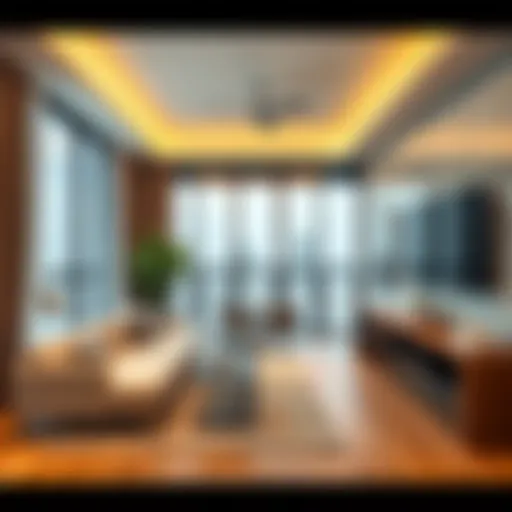Discovering the Best Decor Companies in Dubai
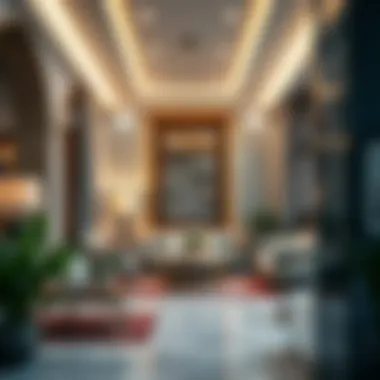

Intro
As the sun sets over the stunning skyline of Dubai, it reveals a city where the brilliance of modern architecture dances with the charm of tradition. In this bustling metropolis, decor companies play a pivotal role in shaping not just living spaces but experiences. They bring life to empty walls and transform ordinary homes into works of art. This article takes a closer look at the vibrant landscape of decor companies in Dubai, exploring their unique offerings, the market dynamics that define them, and the trends that are influencing both design and investment decisions.
The realm of interior design here is like a melting pot, blending contemporary styles with Middle Eastern flair. Each decor company brings its own fingerprint to the table, reaching out to an eclectic clientele ranging from expatriates searching for a slice of home to investors seeking the next big thing in real estate. As we delve further into this topic, we will uncover the distinct services these companies provide, the latest trends that are gaining traction, and the important factors influencing consumer choices.
In a city where innovation meets luxury, understanding the dynamics of this sector is crucial for anyone looking to navigate the world of interior decoration, whether for personal fulfillment or investment.
Market Trends
Current Market Analysis
The decor industry in Dubai is currently experiencing a significant boom. High competition drives innovation and creativity among companies striving to establish their branding. Many builders and property developers are focusing on high-end finishes and unique designs to appeal to buyers. The demand for bespoke interiors is growing, correlating directly with both the tourism and expatriate demographics.
As locals and expatriates alike start to invest more in their living spaces, companies are responding with a range of offerings:
- Customized interior solutions: Many decor companies are now creating tailored designs that fit the exact needs and preferences of clients, making spaces uniquely theirs.
- Sustainable materials: There is also a noticeable shift toward eco-friendly materials, reflecting a growing awareness of environmental concerns among consumers.
- Increased use of technology: Companies are now incorporating smart home solutions into their designs, enhancing both convenience and modern aesthetics.
Future Predictions
The future of decor companies in Dubai seems bright and bustling. As global trends shift towards minimalism and sustainability, one can expect to see a growing number of decor companies leaning towards these principles. Furthermore, as Dubai continues to position itself as a global cultural hub, the demand for diverse design styles will only increase.
This economic vibrance is expected to attract more foreign designers and companies, thereby enriching the existing market with even more creativity. With new developments on the horizon, including luxury residential projects and commercial spaces, the competition within the decor sector will likely heat up.
"The ability to create compelling spaces that reflect a sense of culture and identity will be key for decor companies to thrive in the coming years."
In summary, diving into the world of decor companies in Dubai reveals not only the uniqueness of each player in the industry but also the evolving preferences of consumers. This creates an exciting and dynamic environment for anyone with a stake in the market, from individual buyers to agents managing luxury listings.
Prelude to Dubai's Decor Scene
The decor scene in Dubai acts as a mirror reflecting the city's rapid evolution and unique identity. This section aims to shed light on the components that define the interior design landscape of this remarkable city—elements that are crucial for anyone looking to invest, design, or simply appreciate the art of decor in Dubai.
The Evolution of Interior Design in Dubai
Dubai's journey in the interior design sphere has been nothing short of remarkable. From the sepia-toned inspirations of its Bedouin heritage to today’s high-tech, avant-garde aesthetics, the evolution is stark. In earlier years, homes typically flaunted modest furnishings with a preference for traditional fabrics and earthy colors. However, as the city burgeoned into a global hub, the demand for extravagant and modern designs surged.
In recent times, interior design has adopted an eclectic blend, integrating international trends whilst retaining a whisper of local culture. Designs now range from sleek, glass-clad modernity to richly textured, Arabian-inspired motifs. For instance, spaces might incorporate minimalist furniture alongside intricate mosaic tile work, showcasing an interesting dichotomy that mirrors Dubai's own contrasts.
This evolution signifies not just a change in preferences but also an acknowledgment of Dubai's role as a melting pot of cultures. It opens the door for decor companies to innovate, catering to diverse tastes—from contemporary cosmopolitan styles to classical Arabian elegance.
Cultural Influences on Contemporary Decor
Dubai’s decor landscape is undeniably influenced by its multicultural fabric. The residents, hailing from all corners of the globe, bring unique design tastes that are both vibrant and varied. Islamic art, for instance, plays a significant role in influencing modern decor. Geometric patterns and arabesque designs can frequently be seen adorning walls and furnishings, creating a sense of richness and detail that complements contemporary styles.
Moreover, elements of Asian, European, and Middle Eastern architectures have woven themselves seamlessly into the contemporary scene. This blend of global influence has led to innovative designs that are often at the cutting edge of trends. For example, the use of biophilic design—incorporating natural elements into indoor aesthetics—has gained popularity, often drawing inspiration from traditional gardens found in historic Arabic homes.
Decor companies in Dubai have adeptly responded to this festive cultural influence. They create spaces not just to impress but to tell stories that connect the past to the present. As clients look to personalize their homes and offices, these studios craft environments that reflect diverse heritages, making each space a unique tapestry of cultural narratives.
Key Players in the Dubai Decor Market
When it comes to understanding the decor landscape in Dubai, recognizing the key players can’t be overstated. These companies aren’t just businesses; they shape the aesthetic identity of the city itself. Their influence stretches beyond simple interior design, impacting real estate valuations, lifestyle choices, and even cultural trends. As such, distinguishing between established brands and emerging designers is pivotal for anyone looking to navigate this vibrant market effectively.
Established Brands vs. Emerging Designers
Established brands have solidified their place in the market through years of credibility and a proven track record. Companies like Al Huzaifa, with a legacy that spans decades, have built their reputation on a blend of luxury and quality. Their portfolios often include high-profile projects in hotels and upscale residences, showcasing their capability to merge functional design with artistic excellence.
These established players benefit from recognition and customer loyalty, often commanding higher prices for their services. However, they may also be perceived as somewhat predictable, focusing on tried-and-true aesthetics that appeal to a wide audience.
In contrast, emerging designers contrast sharply with innovative approaches. Consider the likes of Katch + Rache, a newer outfit that aims to disrupt the traditional aesthetic associated with Dubai. Their designs draw inspiration from minimalism and sustainability, creating bespoke pieces tailored for the modern homeowner.
"In a city that thrives on originality and grandeur, the real art lies in merging tradition with new ideas."
This influx of fresh talent provides homeowners and businesses with an expanded choice, allowing for unique interpretations of space. While some emerging designers might lack the historical prestige, their creativity can often resonate more deeply with a clientele looking for personalized touches. Ultimately, balancing the reliability of established brands with the daring ideas of upcoming designers could provide a richer decor experience.
Local vs. International Firms
The decor market in Dubai is often a melting pot of local talent and international giants. On one hand, local firms have an intrinsic understanding of the cultural nuances and preferences unique to the region. Companies like Interior Design and Decoration offer designs that harmonize well with local traditions, making them well-respected among residents who prioritize cultural authenticity.
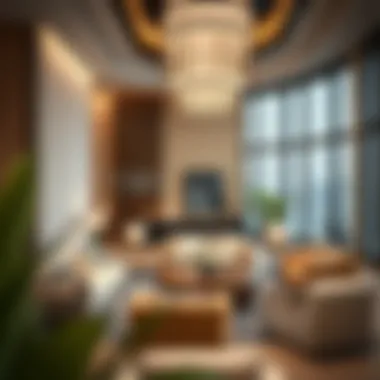

International firms, however, wield significant influence due to their extensive experience and diverse portfolios. Names like Gensler and HOK are synonymous with global design trends, providing services that marry modernity with luxury. Their capability to deliver large-scale projects often comes with a steep price tag, reflecting their brand’s established recognition on a global scale.
Both local and international firms face the challenge of adapting to Dubai's rapidly evolving market. As more expatriates settle in the city, their varied tastes and cultural backgrounds present opportunities and challenges. This dynamic creates a diverse selection of decor offerings, catering to an eclectic mix of styles that can sometimes clash or blend seamlessly.
In a nutshell, the interplay between local sensibilities and global standards defines the decor marketplace in Dubai, offering clients the best of both worlds—comprised of tradition and modern inspiration.
Popular Interior Design Styles in Dubai
The interior design landscape in Dubai is a complex and colorful tapestry, woven together by a mix of old and new influences. With a flourishing real estate market and an influx of diverse cultures, the styles that emerge reflect this vibrant dialogue. Understanding the popular interior design styles is crucial not just for aesthetic appreciation but also for making informed decisions whether you're planning a space, investing in property, or looking to create a welcoming atmosphere for your home or business.
Several notable styles characterize the decor scene in Dubai, including Modern Minimalism, Traditional Arabian Aesthetics, and Luxury and Opulence. Each of these styles offers distinct benefits and considerations, allowing decorators, homeowners, and investors to tailor their environments to meet specific preferences.
Modern Minimalism
Modern Minimalism in Dubai emphasizes simplicity and functionality. In a city known for its dramatic architecture and bustling lifestyle, minimalistic designs offer a serene contrast, creating spaces that feel calm and uncluttered. This style is characterized by open spaces, neutral color palettes, and the use of natural materials like wood and stone.
One of the critical benefits of embracing Modern Minimalism is the focus on maximizing space. In urban environments where square footage is often at a premium, minimalist design allows for more efficient use of space without sacrificing comfort or style. Furthermore, a minimalist approach often means reduced maintenance, making it appealing for busy professionals and families alike.
"Every piece counts; when there's less, every detail shines."
The practicality of modern minimalism doesn’t mean it is devoid of character. You can incorporate personal touches through carefully selected art pieces or statement furniture that resonates with your lifestyle while keeping the overall aesthetic clean and organized.
Traditional Arabian Aesthetics
Traditional Arabian Aesthetics celebrate the rich cultural heritage of the Middle East. This style is characterized by intricate patterns, luxurious fabrics, and a strong use of color. Elements such as mashrabiya (wooden latticework) and ornate tile work can often be spotted in homes and public spaces, marrying visual beauty with functional design.
For decor companies in Dubai, tapping into this aesthetic can be advantageous, particularly when catering to a clientele that cherishes heritage and authenticity. Beautifully designed interiors echoing traditional aesthetics invite warmth and hospitality, making them a favorite in residential spaces where family gatherings take place.
When utilizing Traditional Arabian Aesthetics, it’s important to balance the rich colors and bold patterns with lighter elements to ensure spaces don’t feel overwhelming. This style offers an opportunity for personalization, showcasing artifacts and artwork that tell one’s story while honoring cultural traditions.
Luxury and Opulence
Dubai is renowned globally as a bastion of luxury, particularly in its real estate and interior design markets. The Luxury and Opulence style reflects a level of grandeur often associated with high-end living. Think high ceilings, grand chandeliers, and statement furniture pieces that are both aesthetically pleasing and functional.
This style appeals directly to a high-end market, often attracting expatriates and affluent local buyers who are looking for a lavish lifestyle experience. The benefits of luxury design extend beyond mere aesthetics; such spaces often come fitted with state-of-the-art technology and premium materials that enhance comfort and convenience.
Choosing Luxury and Opulence as a design direction requires careful consideration. It’s essential to create cohesive visual narratives throughout different spaces, ensuring that each room captures that elevated feeling of sophistication without feeling ostentatious.
In summary, whether leaning towards the serenity of Modern Minimalism, the character of Traditional Arabian Aesthetics, or the splendor of Luxury and Opulence, these styles represent the essence of Dubai's decor, offering rich possibilities for personal expression and investment potential. It's crucial to choose a style that resonates with both your values and the project at hand.
Services Offered by Decor Companies
The landscape of decor in Dubai is vibrant and multifaceted, representing various styles and cultures. As consumers increasingly seek personalized environments, the services offered by decor companies play a pivotal role in catering to diverse needs and preferences. In this section, we will explore the different offerings that decor companies provide, showcasing how they adapt to individual requirements and the market's dynamic nature.
Residential Interior Design
Residential interior design is a crucial service for families and individuals looking to create comfortable and aesthetically pleasing homes. Decor companies specialize in this area by providing tailored solutions that reflect the personal styles and lifestyles of their clients. This process often entails a thorough understanding of space utilization, color theory, and contemporary trends.
- Consultation: It typically begins with a detailed consultation phase, where designers engage with clients to identify their tastes, needs, and budget constraints. A designer may ask deep questions about how the space will be used daily, which helps in forming a vision.
- Mood Boards and Previews: After gathering information, designers create mood boards and 3D visualizations. This step allows clients to see how furniture, textiles, and colors will work together before any purchase.
- Execution and Coordination: Once a design is approved, the decor company oversees the execution. This involves coordinating with various tradespeople, from carpenters to electricians, ensuring the vision materializes correctly.
This whole process not only adds value but also guarantees the space harmonizes functionality with aesthetics. Such services empower residents to express themselves within their own walls.
Commercial Space Planning
On the other side of the coin, commercial space planning is an integral function that focuses on businesses, offices, and public spaces. The objective is to create efficient and inspiring environments that boost productivity and represent the brand's identity. Decor companies must navigate a variety of considerations, including regulatory requirements, spatial challenges, and the dynamics of team collaboration.
- Strategic Layouts: Companies work with business owners to design strategic layouts. This includes everything from the location of workstations to meeting rooms and communal areas, aimed at enhancing workflow and employee interaction.
- Brand Integration: Effective commercial design integrates brand elements seamlessly. Designers might choose colors and materials that reflect the company’s ethos, creating a cohesive atmosphere that resonates with customers and employees alike.
- Adaptability: Trends in commercial spaces also shift rapidly, often requiring adaptable designs. Companies should be prepared to update interiors to accommodate new trends, technology, or shifting work environments.
By focusing on commercial space planning, decor companies contribute significantly to the professional image of businesses, helping them thrive in a competitive marketplace.
Renovation and Remodeling Services
Renovation and remodeling services are increasingly sought after in Dubai’s decor scene, given the fast-paced urban development. Whether a business or home, property owners often wish to update, refresh, or entirely redefine their space. This segment requires specialized skills and a keen eye for detail.
- Assessment of Existing Conditions: The process often starts with a thorough assessment. Designers evaluate existing structures and features while discussing client goals for the renovation.
- Innovative Solutions: Renovation may involve creative problem-solving, especially in older buildings with unique layouts or design limitations. Decor firms often provide innovative solutions that marry the old with the new.
- Sustainability Focus: There is also a growing trend toward sustainability. Many companies are now offering eco-friendly renovation options, utilizing recycled materials or optimizing energy efficiency in their designs.
Through these services, decor companies can unlock the latent potential in existing spaces, creating refreshing environments that reflect both modernity and creativity.
These services not only tailor unique experiences for clients but also contribute to the evolving decor ecosystem in Dubai, where functionality meets innovative design.
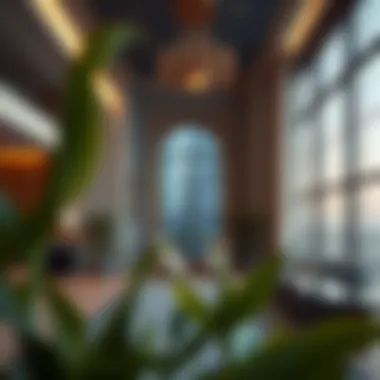

Emerging Trends in Decor
The world of interior design is ever-changing, especially in a vibrant market like Dubai. Understanding the emerging trends in decor is not just about keeping pace with the aesthetics; it's crucial for investors, expats, and design enthusiasts who aspire to make informed choices. The importance of these trends cannot be overstated, as they reflect broader societal shifts and preferences.
Through this exploration, we will discuss how sustainability, smart home integration, and biophilic design principles are reshaping the decor landscape. Each trend presents a unique opportunity for companies to differentiate themselves, offering clients not just beauty and style, but functionality and relevance in a world that's increasingly conscious.
Sustainability in Interior Design
With the concerns surrounding climate change and resource depletion, sustainability has moved from a buzzword to a necessity. It's not just about using eco-friendly materials; it’s about adopting a holistic approach to how spaces are designed, constructed, and maintained. In Dubai, decor companies are stepping up to the plate.
The emphasis is on:
- Using recycled and upcycled materials: This not only reduces waste but also adds character and uniqueness to spaces.
- Energy-efficient solutions: Many new builds feature smart systems that monitor and reduce energy consumption, guiding design that prioritizes natural light and ventilation.
- Water conservation methods: Utilizing low-flow fixtures and landscape xeriscaping keeps the focus on preserving precious water resources.
"Sustainability in design is no longer a trend; it is the future. Every choice reflects our response to environmental challenges."
The integration of sustainable practices not only meets consumer demand but can also enhance the marketability of a property—making it a win-win for developers and buyers alike.
Smart Home Integration
In an era dominated by technology, smart home integration stands as a game changer in the Dubai decor scene. From smart thermostats to interconnected home appliances, the focus is on creating seamless experiences for residents.
The features being incorporated include:
- Voice-activated systems: Clients can control lighting, security, and HVAC systems with ease. This aligns perfectly with Dubai's modern lifestyle—where convenience and luxury go hand in hand.
- IoT Devices: From smart fridges that notify you when your groceries are low to automated blinds that adjust according to the sunlight, these elements add a layer of sophistication and practicality.
- Customizable settings: Many companies are starting to offer tailored smart solutions enhancing personalization, which is a significant trend in home decor.
This integration positions decor companies not merely as designers but as tech innovators, helping clients elevate their living standards.
Biophilic Design Principles
Incorporating nature into urban life is more than just a trend; it’s a fundamental principle that resonates deeply in modern decor. Biophilic design principles focus on creating spaces that foster connections with the natural environment. This approach has been gaining traction in Dubai, where the climate often poses a barrier to outdoor living.
Key aspects include:
- Natural materials: Using wood, stone, and other elements that echo nature can create a calming atmosphere that contrasts with the urban hustle.
- Greenery integration: Vertical gardens and indoor plants are not just aesthetic choices; they also improve air quality and contribute to well-being. Companies are exploring innovative ways to bring greenery indoors, making spaces feel more inviting.
- Natural light maximization: Large windows and open layouts are gaining popularity, allowing residents to feel more connected to the outdoors.
These principles resonate with a clientele eager for refreshing and health-oriented environments; thus, the incorporation of biophilic elements is helping Dubai's decor firms to stand out.
In summary, the emerging trends in decor within Dubai reflect a blend of contemporary demands and timeless principles. As sustainability, smart technology, and nature-inspired design continue to evolve, they are reshaping consumer preferences and driving innovation in the interior design field.
Consumer Preferences and Market Dynamics
Understanding consumer preferences and the underlying market dynamics is crucial in the decor industry, especially in a vibrant hub like Dubai. As a melting pot of cultures, the city reflects diverse tastes and influences in interior decoration. This section sheds light on why grasping these factors is essential for businesses and clients alike.
Factors Influencing Decor Choices
Many elements shape how people in Dubai choose their decor. Notably, cultural backgrounds and personal experiences play central roles. In a city that hosts over 200 nationalities, it is no surprise that individuals bring varied preferences. For instance, while a Western expatriate might lean towards minimalist Scandinavian designs, a local resident may prefer ornate patterns reminiscent of Arabian architecture.
Furthermore, seasonal trends also impact decor choices. With climatic conditions affecting how spaces are enjoyed—think of outdoors spaces getting less attention in scorching summer months—designers need to stay agile, adapting strategies to engage clients year-round.
Another consideration is sustainability. With rising awareness regarding environmental issues, many consumers prioritize eco-friendly materials and practices in their selections. Whether it’s reclaimed wood furnishings or energy-efficient lighting systems, the shift towards greener options is evident.
"Investing in sustainable decor not only beautifies a home but also leaves a lighter footprint on the planet."
In addition, the increase in digital consumption means that social media platforms like Instagram and Pinterest heavily influence what people desire in their spaces. Images of well-decorated homes flood these sites, pushing trends rapidly into public consciousness. This enhances the pressure on decor companies to stay ahead of the curve, catering to evolving tastes while maintaining quality.
Importance of Personalization
In today's market, mere selection of designs and materials does not suffice. Consumers are actively seeking personalized solutions that reflect their unique identities and lifestyles. This trend is particularly pronounced in Dubai, where individuality stands out.
Personalization in decor can stem from different sources:
- Cultural Significance: Many people choose to introduce elements that resonate with their heritage. This could be artwork or textiles that tell a story of their origin.
- Functional Needs: A family might require child-friendly materials or space for entertaining guests, compelling designers to mold spaces that are not only aesthetically pleasing but also practical.
- Emotional Resonance: Colors and designs can evoke feelings. A client might select shades that remind them of peace, joy, or a special memory, emphasizing how emotional connections drive decor choices.
The emphasis on personalized design is not simply a fleeting whim; it has real benefits for businesses in the industry. The more tailored an experience is, the more loyalty and trust a decor company can cultivate with clientele. Embracing personalization enables companies to stand out in a bustling market, leading to repeat business and referrals.
Challenges Faced by Decor Companies
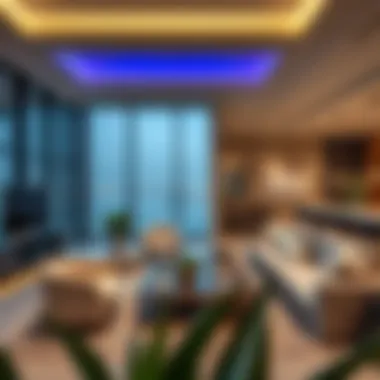

The decor industry in Dubai is buzzing with excitement yet fraught with challenges that companies must adeptly manage. Understanding these hurdles is crucial for anyone looking to tap into this vibrant market. From supply chains to shifting trends, the landscape can be as intricate as some of the designs that adorn the lavish spaces in this city.
Navigating Global Supply Chains
The global supply chain is the backbone of the decor business. You see, Dubai serves as a hub for international trade, which means decor companies often rely on suppliers from all corners of the globe. This reliance, while beneficial in terms of variety and innovation, can also lead to complications.
For instance, delays in shipping due to geopolitical issues or natural disasters can wreak havoc on project timelines. Moreover, fluctuating costs of materials can impact pricing strategies. In essence, companies often walk a tightrope, balancing quality and cost-effectiveness.
To navigate these choppy waters, firms are increasingly embracing technology to streamline logistics. Tools for inventory management, real-time tracking, and predictive analytics are more than buzzwords; they are now necessities in ensuring timely delivery.
- Digital Platforms: Tools like Alibaba and other e-commerce platforms improve access to global suppliers.
- Local Partnerships: Collaborating with local vendors can mitigate some supply chain risks.
- Alternative Materials: Utilizing locally sourced materials can help in cutting costs and time.
In summary, decor companies in Dubai must continually innovate and adapt their supply chain strategies to keep up with the fast-paced market demands.
Adapting to Rapid Market Changes
The decor landscape in Dubai is ever-evolving, presenting yet another challenge. Customer preferences can shift overnight due to trends seen on social media or changes in economic policies. It’s a bit like chasing a moving target; you think you’ve hit the bullseye, and then the bullseye changes shape entirely.
To stay relevant, decor companies need to cultivate a keen sense of market awareness. This can mean getting on social media platforms like Instagram and Pinterest, where new design ideas often go viral. Companies also need to analyze their competitors and understand emerging trends, such as sustainability or biophilic design, that consumers are gravitating towards.
Additionally, flexibility in business operations is vital. Some companies are restructuring their teams to be more adaptive, allowing them to pivot swiftly in response to market demands.
Key strategies include:
- Trend Analysis: Monitoring social media and industry reports for spotting changes.
- Feedback Loops: Establishing mechanisms to gather client feedback on designs and services.
- Rapid Prototyping: Using tools that allow for quick adjustments in design and production to meet client needs.
The ability to adapt not only keeps companies afloat but can also set them apart as leaders in the Dubai decor market.
To thrive in the competitive decor industry in Dubai, an agile mindset and quick-response strategies are non-negotiable.
In wrapping up, the challenges faced by decor companies in Dubai reflect the dynamic nature of this market. Those who navigate supply chain complexity and adapt to rapid changes are more likely to succeed amidst these competitive and volatile conditions.
The Future of Decor in Dubai
Understanding the future of decor in Dubai is pivotal for all players in the market, whether they are investors looking for viable opportunities, expats planning to make the city their home, or design enthusiasts keen to stay abreast of trends. The ever-evolving landscape of Dubai's interior design isn't merely a reflection of aesthetic preferences; it represents cultural dialogues, technological advances, and shifts in consumer behavior.
As Dubai continues to thrive as a global hub, its interior design industry who are shaping its future remain influenced by deeper currents, such as sustainability, technology, and cultural relevance. Each of these elements not only impacts how spaces are designed but also defines the character of the city itself.
Predicted Shifts in Design Trends
In Dubai, design trends often mirror the pace of the city’s growth. One can expect an embrace of biophilic design, which incorporates natural elements to nurture the well-being of occupants. There’s a marked transition from purely opulent styles to more sustainable and functional aesthetics. This evolution can be credited to a growing awareness among consumers about environmental impact and wellness.
- Sustainability is set to be at the forefront: More decor companies are choosing materials that are eco-friendly, promoting longevity and responsibility in their projects.
- Multi-functionality will gain traction, with spaces designed to accommodate more than one purpose to better suit urban lifestyles.
- Cultural Integration with modern techniques will also create a unique blend—traditional motifs might be reinterpreted through a contemporary lens, giving rise to a distinctly local aesthetic yet grounded in narrative.
Ultimately, these predicted shifts point towards a more thoughtful approach to design—one that considers not just eye-catching visuals but also harmony with the environment, user experience, and cultural context.
The Role of Technology in Design Innovation
Technology plays a critical role in shaping the future of decor in Dubai. With the rise of smart home technology, clients are looking for more than just stylish interiors; they seek functionality woven seamlessly into their living spaces.
The integration of automated systems, remote controls, and connected devices streamlines daily life in ways that enhance comfort and efficiency. Interior designers and decor companies are now tasked with incorporating tech elements without compromising aesthetic integrity.
Some key aspects include:
- Virtual Reality (VR): This innovative tool allows both designers and clients to visualize spaces before implementation, significantly minimizing expensive changes down the road.
- Augmented Reality (AR): AR apps will help customers see how furniture aligns with their existing decor instantly through their mobile devices, which further enhances the personalization of services.
- 3D Printing: Custom furniture and decor can be created more efficiently, giving a highly personalized touch that was once reserved for high-budget projects.
"In a city that thrives on innovation, the intersection of decor and technology will define the next chapter of Dubai's design narrative."
The anticipated influence of technology is a testament to how the decor industry adapts to meet the expectations of a forward-thinking clientele. With ongoing advancements, the characterization of spaces will constantly evolve, keeping Dubai at the forefront of global design paradigms.
Culmination
As we reflect on the intricacies of Dubai's decor landscape, it becomes clear that the industry is not just about aesthetics; it embodies a rich tapestry of culture and innovation. The unique blend of traditional influences with modern design principles creates a dynamic and ever-evolving marketplace. Each decor company contributes to this vibrant scene, offering distinctive styles and services tailored to meet a diverse clientele's needs.
Final Insights on Dubai’s Decor Landscape
The decor companies in Dubai hold substantial significance for various stakeholders—investors, expats, agents, managers, and buyers all play crucial roles in shaping the market. Understanding the interplay between consumer preferences and design trends is essential.
- Diversity of Offerings: The variety in styles, from modern minimalism to luxurious Arabian aesthetics, ensures that there is something to cater to everyone. Clients can choose designs that resonate with their unique tastes or align with the cultural richness of the city.
- Cultural Fusion: The decor styles in Dubai are not only visually appealing but also reflect the city's multicultural spirit. This fusion allows for creative designs that speak to both local traditions and global influences.
- Sustainability: Increasingly, companies are embracing sustainable practices. This shift towards eco-friendly materials and designs not only addresses environmental concerns but also appeals to a growing market of conscious consumers.
- Technology Integration: With the rise of smart homes, many decor firms are incorporating advanced technology into their designs, enhancing functionality while maintaining aesthetic appeal. This forward-thinking approach positions companies to remain relevant and competitive in a fast-paced market.
- Tailored Experiences: Personalization is key in Dubai’s decor scene. Firms that offer customized solutions or bespoke designs are gaining a competitive edge, catering to the distinctive needs of their clients and setting trends in the process.
Overall, Dubai’s decor companies are not merely service providers; they are key players in a larger narrative about innovation, culture, and the future of interior design. Whether you're an investor looking at the market potential or a design enthusiast eager to explore the latest trends, understanding this landscape is essential for navigating your journey in Dubai’s dynamic decor world.
"Dubai doesn't just inspire creativity; it ignites innovation in the decor scene, making every space a testament to what's possible."
This exploration of decor companies in Dubai illustrates a microcosm of the larger architectural and design ambitions of the city itself. It is a visual and functional conversation, an invitation to see beyond traditional boundaries, and a prompt for what's to come.










